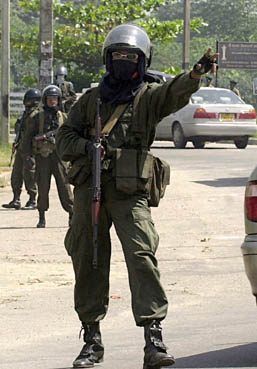 |
Sri Lanka will not repeal its draconian security legislation to satisfy demands by India, the United States or Britain or keep them ‘happy,’ Defence Secretary Gotabaya Rajapaksa was quoted as saying.
Only his brother, President Mahinda Rajapaksa, knows what is best for the country, he reportedly asserted.
See reports by The Sunday Leader and ColomboPage.
Since the end of the armed conflict, Sri Lanka has been under pressure from the international community to repeal the Emergency Regulations, which give sweeping powers to its military and police.
Along with the Prevention of Terrorism Act (PTA), the Emergency Regulations have long been criticised by international human rights groups for the immunity they grant to security forces who commit rights abuses.
Amnesty International says of the ER and PTA:
"Successive governments have used national security as an excuse to introduce a range of broad of emergency regulations."
"This has led to the erosion and even suspension of people’s rights to freedom of thought, conscience and expression, as well as their right to live free from arbitrary arrest and detention."
"The national security laws grant state authorities sweeping powers of detention and permit people to be held in secret locations.
"Security agents, often without proper uniforms or identification, can detain and hold suspects for months or years without a warrant or being produced before a magistrate."
See the statement, and find a link to the briefing paper 'Forgotten prisoners: Sri Lanka uses anti-terrorism laws to detain thousands', here.
The extension of the Emergency Regulations requires parliamentary approval every month.
However, ER has almost always drawn consensus from Sri Lanka's Sinhala parties and pro-government paramilitary group-cum-political parties, while mainstream Tamil parties have opposed.
Recently a US congressional committee voted to ban aid to Sri Lanka unless, amongst other key issues such as accountability for war crimes, the emergency regulations were brought to an end.
India has also called for an end to the powers. Foreign minister SM Krishna raised the matter with his Sri Lankan counterpart, GL Peiris, in May this year - the second anniversary of the war's end (see BBC's report here).
Sri Lanka's hardline regime has repeatedly pledged to repeal the state of emergency.
But, “despite the defeat of the LTTE in May 2009, the government has failed to demonstrate its commitment to human rights and the rule of law by getting rid of the PTA,” Amnesty International's Sam Zarifi said earlier this year.
Mr. Gotabhaya’s comments comes less than a month after Prime Minister DM Jayaratne told parliament that "steps have already been taken to lift emergency regulations in consultation with the (National) Security Council".
Sri Lanka first introduced a state of emergency in 1971, since which time it has been in place almost continuously. It was repealed during the Norwegian-brokered peace process but was reinstated in 2005.
